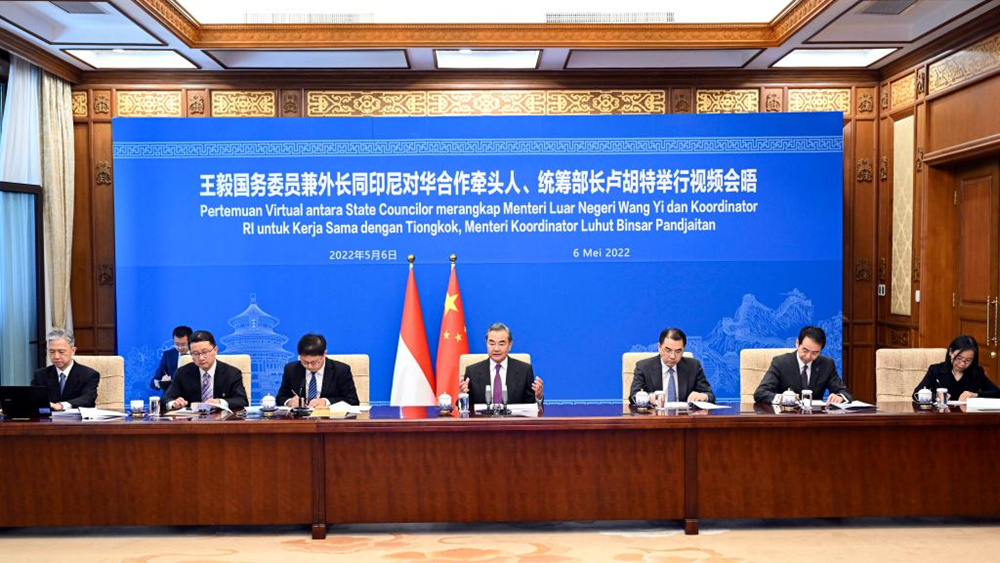
Chinese State Councilor and Foreign Minister Wang Yi meets with Indonesia's Coordinator for Cooperation with China and Coordinating Minister Luhut Binsar Pandjaitan via video link, May 6, 2022. [Photo/Xinhua]
By Hannan Hussain
On May 6, Chinese State Councilor and Foreign Minister Wang Yi held a virtual exchange with Indonesia's Coordinator for Cooperation with China and Coordinating Minister Luhut Binsar Pandjaitan. Both sides underlined their resolve to safeguarding peace and stability in East Asia, with Wang making valuable observations on the dangers of select strategies and alliances to the ASEAN-centered regional cooperation architecture. "No matter what regional strategy is proposed, its purpose should be mutual benefit and win-win, not a zero-sum game," said Wang.
The U.S.-backed Indo-Pacific strategy is regarded as incompatible with the long-term interests of regional powers. Consider the fact that the strategy's supplementation of cooperation by containment starkly contrasts with ASEAN's stated principle of non-interference. "The U.S. Indo-Pacific strategy goes against the trend of the times and does not serve the common and long-term interests of countries in East Asia," clarified Wang.
Similarly, the Quadrilateral Security Dialogue, or Quad, is driven by the expectation that regional appetite for a Cold War mentality and group confrontation exists in East Asia. Yet, ASEAN's own outlook on the Indo-Pacific is geared towards boosting confidence and trust in the region, optimizing existing ASEAN-led mechanisms, and puts a premium on contributing to the "maintenance of peace, freedom, and prosperity."
And so, Wang's emphasis that East Asia already has a dependable regional cooperation structure eliminates the need for any externally composed strategy to determine what is in the region's long-term interests.

People visit Sanur beach in Bali, Indonesia, October 3, 2021. [Photo/Xinhua]
Over the years, both Jakarta and Beijing have been largely supportive of an ASEAN-China Code of Conduct (COC) in the South China Sea, a guiding mechanism seen as significant for maritime cooperation by ASEAN states. There is also little doubt that the situation in the South China Sea has been generally stable, despite groundless speculation from select foreign powers of the maritime "status-quo" being put at risk.
It is against this backdrop, that the existence of select security arrangements including the AUKUS trilateral pact is a needless complication for East Asia's peaceful maritime landscape. Moreover, it struggles to advance principles of "openness, transparency and inclusivity" in the spirit envisioned by regional powers.
How does AUKUS's focus on facilitating an arms race mirror Indonesia and China's interest in safeguarding the common interests of regional countries? It is these determinations that illuminate a key takeaway from Wang's exchange with Luhut: that East Asian nations best align with a strategy that prioritizes regional engagement on an equal footing, and that regional countries must demonstrate vigilance in the face of Cold-War mentality risks.
Further on regional merits, the China-ASEAN comprehensive strategic partnership has been met with sustained optimism from Jakarta and Beijing. Wang's particular attention to both countries' emerging economy statuses and the merits of strengthening bilateral communication and coordination, can help extend a sense of rights protection to other regional powers keen to develop.
This is consistent with Beijing's desire to evolve Sino-Indonesian ties through a "four-wheel drive," where deepening cooperation on various fronts can empower the relationship to contribute to world peace and development in the future.
The China-ASEAN comprehensive strategic partnership captures the spirit of that win-win cooperation view, and is complimented by the mutually endorsed ASEAN Outlook on the Indo-Pacific. The latter, a key reference point in Wang's March exchange with Indonesian Foreign Minister Retno Marsudi, shares none of the camp confrontation or regional tension aims as endorsed by the U.S.-led Indo-Pacific strategy.
Friday's virtual exchange also saw Luhut's support for Indonesia's participation in the China-proposed Global Development Initiative and the Global Security Initiative (GSI). For instance, GSI itself puts a premium on noble imperatives such as uniting on non-interference in internal affairs.
The risks dealt to such matters by external regional interference at present reinforce the need for China and Indonesia to invest in what Luhut characterized as the "mutually-beneficial" nature of their relationship.
Ultimately, Indonesia and China's confidence in elevating their multilayered engagement to the benefit of the region is a major plus for upholding what matters the most to East Asian stability: the ASEAN-centric regional cooperation structure and its leading role in guaranteeing peace and stability.
The author is a foreign affairs commentator.

 中文
中文



